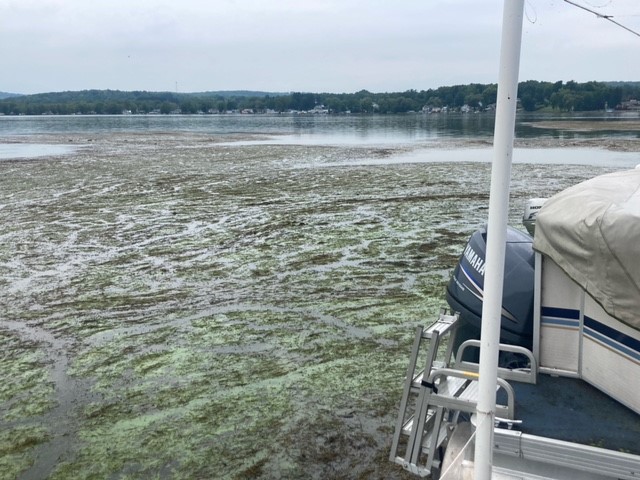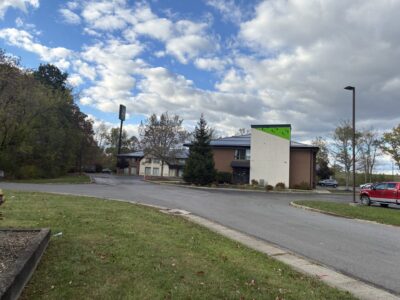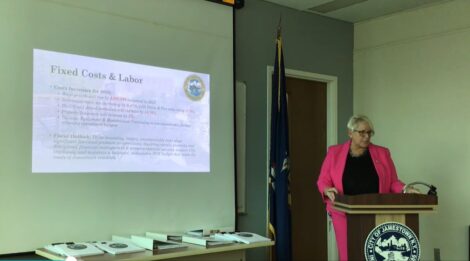Burtis Bay Weeds Stir Debate

Pictured is a bed of weeds in Chautauqua Lake’s Burtis Bay in late August. Submitted Photo
The troubling conditions of Chautauqua Lake have generated a county-wide debate, as local leaders and community members place increased pressure on Chautauqua County to take additional action on the lake.
Jim Wehrfritz, a lake consultant from the town of Ellery, Mark Franz, a hotel developer, and other community members presented their concerns during Chautauqua County’s recent Legislature meeting.
WENDEL: WORKING ON LAKE CONSTANTLY
Chautauqua County Executive PJ Wendel said the concerns emphasized by Franz and Wehrfritz are something the county is “working on constantly.”
“That comment that there was a proposal given to the county that we haven’t done anything on is not accurate,” he said. “The information was given to us was a weed boom to put in the south base in new Burtis Bay. We had a company that did that and gave us a recommendation, which was the ineffectiveness of that weed boom.”
Wendel said additional concerns such as how the weed boom would be cleaned, when it would be cleaned, where it would be placed and how it would be anchored were also taken into consideration.
While members of the community expressed their belief at the Legislature meeting that the negative conditions of the lake are the county’s responsibility, Wendel said Chautauqua Lake is a state lake.
“The state owns it,” he said. The state has control over what happens in the lake and what type of cleanup and measures there are. The state is an absentee landlord. They collect money from the revenues generated by the lake but give us minimal dollars as far as its management.”
Despite having a different viewpoint than Franz and Wehrfritz, Wendel acknowledged the problem with weeds and other issues with the lake have become annual challenges.
Nevertheless, he said Chautauqua County is taking steps to clean up the lake.
“We are looking at strategies as to how to clean the lake,” he said. “The county has tried to coordinate efforts with our lake management groups.”
On a positive note, Wendel said he has recently discussed more collaborative efforts with the Department of Environmental Conservation and is hopeful that additional help will be provided in the future. According to Wendel, the new regional director of the DEC appears to be more supportive of the county’s lake management efforts than previous directors.
Instead of debating who is to blame for the current condition of the lake, Wendel said he is pushing for unity and collaboration between the county and its partnering agencies.
“I want to see collaborative efforts between those involved in our lake management,” he said. “We have an organization that has been here for many years and is doing a remarkable job, but we have another emerging group that has a new approach to lake management as well. We need to focus on different methods and think outside the box a little bit. We know what works; we know what doesn’t work. Now, we need to try these things that might be out there as options.”
Wendel said the concerns pertaining to Burtis Bay are already being addressed. He said the county is working with different organizations to “remedy” the conditions and “clean up” the south basin. However, he acknowledged that Burtis Bay presents a unique challenge for the county.
“If you look at Chautauqua Lake, Burtis Bay is the last bay before it leaves the outlet,” he said. “Burtis Bay is the last catch basin. We do need to have a more concerted effort with weed cleanup and weed management and fragmentation management.”
As the county continues to move forward with plans for improving Chautauqua Lake, Wendel said funding is one of the focal points his team is looking at. The Chautauqua Lake Protection and Rehabilitation Agency is one group that he indicated could be instrumental for funding.
Wendel also said he has requested Gov. Kathy Hochul for state funding to study the harmful results of algae blooms as part of the state’s HAB Lakes initiative.
“We know what needs to happen,” he said. “We know what measures we’ve done in the past, and we know what we need to change. It’s just a matter of getting those partnerships together and working together to increase our efforts in cleaning and maintaining the lake.”
ELLICOTT SUPERVISOR: COUNTY NEEDS TO TAKE BIGGER ROLE
While Wendel expressed optimism and confidence that Chautauqua County is taking the necessary steps to improve the conditions of Chautauqua Lake, other local leaders have expressed significant doubt.
Janet Bowman, Ellicott town supervisor, said the conditions of the lake have made people’s homes and lakefront property “very unpleasant” and unusable. She said her town is trying to increase its lake management budget, but she believes the county needs to do more to address the issues.
“I feel terrible for the residents that live on the lake,” she said. “It is deplorable. There needs to be a solution. I’m not sure if we have a solution. I think the county needs to take a bigger leadership role in managing the lake.”
Bowman acknowledged the challenges the county has faced with funding, but she said actions needs to be taken on the numerous studies conducted on the lake.
Due to the pattern she has witnessed with efforts to improve the quality of the lake, Bowman said she was unsure whether the CLPRA would be effective at raising funds and implementing lake management techniques.
Regardless of the county’s future plans, Bowman stressed the importance of addressing the issues now.
“It’s not a good situation,” she said. “It’s been something that’s been happening for decades. I think some years it’s worse than other years.”
When asked why the issue has become so controversial in recent months, Bowman said, “I think because residents and businesses are fed up.”
CELORON MAYOR: CATCH WEEDS BEFORE THEY REACH SHORE
Celoron Mayor Scott Schrecengost said the county needs to do something to catch the weeds before they get to the shore.
“It continues year after year, so it’s no surprise, but nothing ever gets done until the damage is done,” he said. “I think they definitely need to get somebody in here that understands what’s going on with the lake.”
Unlike Wendel, Schrecengost believes a weed boom would solve the problem with Burtis Bay, which he says is the area most affected by the lake conditions currently. While he said the weed boom would be expensive, he believes it would prevent the weeds from building up on the shoreline and creating additional problems for the county to address.
Schrecengost said the use of herbicides has resulted in temporary fixes but added that additional measures need to be taken to find a long-term solution. Without a solution, Schrecengost fears the poor conditions of the lake will deter people from coming to the area in the summer.
“It doesn’t look good on the county,” he said. “It doesn’t look good on any of us. I don’t know how many people want to come back when you have to sit there and smell all of that. This should be a wakeup call that everybody’s had enough. I’m just hoping that they’ll get a handle on this. We can’t go too many more years like this. This is getting to be ridiculous.”





